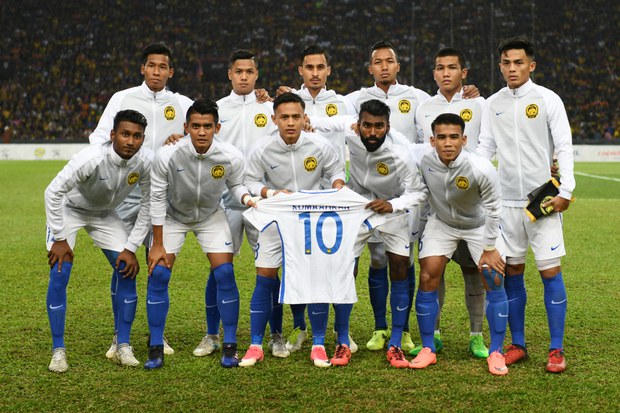Malaysia Bans Travel to North Korea, Cites Tensions Over Missile Tests
2017.09.28
Kuala Lumpur
 Malaysian players display the shirt of injured teammate Kumaahran Sathasivam before the men's football final against Thailand at the 29th Southeast Asian Games in Kuala Lumpur, Aug. 29, 2017.
Malaysian players display the shirt of injured teammate Kumaahran Sathasivam before the men's football final against Thailand at the 29th Southeast Asian Games in Kuala Lumpur, Aug. 29, 2017.
Pointing to heightened nuclear tensions on the Korean Peninsula, the Malaysian government Thursday banned citizens from traveling to North Korea, including the national football team which was forced to postpone a match in Pyongyang next week.
The Football Association of Malaysia (FAM) announced the third postponement of the national men team’s 2019 Asian Cup qualifier match against North Korea, which was to be played on Oct. 5, after Malaysia’s foreign ministry banned travel to the communist state.
The ministry said it took the decision to ban “all Malaysians” from travelling to North Korea “in view of the escalation of tensions in the Korean Peninsula and related developments arising from missile tests.”
“The travel ban will be reviewed once the situation has returned to normal,” the ministry added in a statement.
“Yes, all Malaysian citizens including the national football team and Malaysians working for international agencies, such as the United Nations, are banned from traveling to North Korea,” Deputy Foreign Minister Reezal Merican Naina Merican told BenarNews.
The ministry’s announcement did not specifically name North Korea as it pointed to recent developments in the Korean Peninsula around nuclear weapons and ballistic missile tests. A slew of such tests carried out by Pyongyang this year has raised tensions across East Asia and led to the United States, South Korea and Japan conducting military maneuvers as a show of force.
Earlier this month, the Malaysian government condemned a North Korean missile launch and expressed dismay over the communist regime’s constant defiance of U.N. sanctions. Kuala Lumpur also urged Pyongyang to halt its nuclear and ballistic missile program.
The two nations have maintained diplomatic and commercial ties since 1973, but those were rocked following the assassination of Kim Jong Nam, the half-brother of North Korean leader Kim Jong Un, at a Kuala Lumpur area airport on Feb. 13.
Two Southeast Asian women, who were arrested as suspects in the case, are set to enter pleas on murder charges when their trial at a Malaysian court opens on Monday.
The six-week-long bilateral diplomatic row saw Malaysia and North Korea expel their respective ambassadors and impose exit bans on each other’s citizens. Prime Minister Najib Razak joined South Korea and the United States in blaming North Korean government agents for Kim’s death.
In late March, Malaysia agreed to return Kim Jong Nam’s body to North Korea in exchange for the release of Malaysian embassy staff and their families who had been stranded in Pyongyang as a result of the exit ban that was lifted.
Third postponement
The football match between the two nations had already been postponed twice over diplomatic tensions that arose after Kim Jong Nam was assassinated, according to Malaysian police, with an internationally banned chemical weapon.
The Asian Football Confederation (AFC), the organization overseeing the 2019 tournament, announced the postponement on its website.
“The AFC will now refer the matter to the appropriate committees to decide on the future status of this match,” the confederation said in a statement.
FAM Secretary-General Hamidin Mohd Amin said the national football team, known as Harimau Malaya (the Malayan Tigers), had been preparing to travel to Pyongyang on Tuesday, two days ahead of the match. The team will instead prepare for an Oct. 10 qualifier match against Hong Kong in China.
On Sept. 19, Tunku Ismail Idris Sultan Ibrahim, the crown prince of the southern state of Johor and president of FAM, met with Kim Yu Song, the chargé d’affaires at Pyongyang’s embassy in Kuala Lumpur.
At that meeting, Tunku Ismail was granted rare airspace access into North Korea. Normal protocol requires that planes stop in Beijing before flying onto North Korea, according to a statement following the meeting.
Leading up to the two previous postponements, the crown prince was an outspoken critic of playing the match in Pyongyang and he expressed fears that the national team could be exposed to food poisoning through sabotage.







